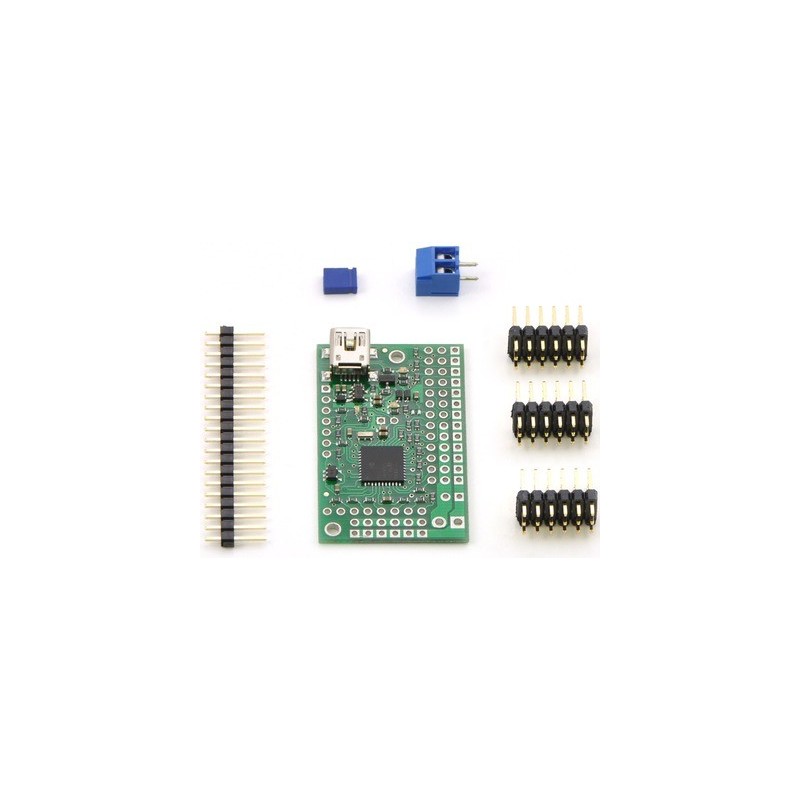



zł156.54 tax excl.

free shipping in Poland for all orders over 500 PLN

If your payment will be credited to our account by 11:00

Each consumer can return the purchased goods within 14 days
The 18-channel Mini Maestro 18 raises the performance bar for serial servo controllers with features such as a native USB interface and internal scripting control. Whether you want the best servo control available (0.25µs resolution with built-in speed and acceleration control and pulse rates up to 333 Hz) or a general I/O controller (e.g. to interface with a sensor or ESC via your USB port), this compact, versatile device will deliver. Header pins are included but not soldered into this partial kit version (all surface-mount components are soldered).
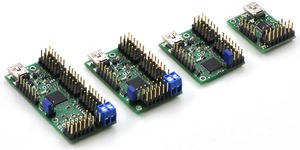 |
| Maestro family of USB servo controllers: Mini 24, Mini 18, Mini 12, and Micro 6. |
|---|
The Mini Maestros are the newest of Pololu’s second-generation USB servo controllers, offering more channels and features than the smaller six-channel Micro Maestro. The Mini Maestros are available in three sizes, and they can be purchased fully assembled or as partial kits:
The Mini Maestros are highly versatile (and compact) servo controllers and general-purpose I/O boards. They support three control methods: USB for direct connection to a computer, TTL serial for use with embedded systems, and internal scripting for self-contained, host controller-free applications. The channels can be configured as servo outputs for use with radio control (RC) servos or electronic speed controls (ESCs), as digital outputs, or as analog/digital inputs. The extremely precise, high-resolution servo pulses have a jitter of less than 200 ns, making these servo controllers well suited for high-performance applications such as robotics and animatronics, and built-in speed and acceleration control for each channel make it easy to achieve smooth, seamless movements without requiring the control source to constantly compute and stream intermediate position updates to the Mini Maestros. The Mini Maestros also feature configurable pulse rates from 1 to 333 Hz and can generate a wide range of pulses, allowing maximum responsiveness and range from modern servos. Units can be daisy-chained with additional Pololu servo and motor controllers on a single serial line.
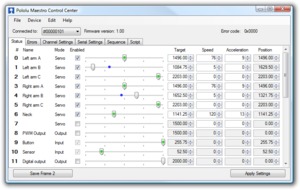 |
| The Status tab in the Maestro Control Center. |
|---|
A free configuration and control program is available for Windows and Linux, making it simple to configure and test the device over USB, create sequences of servo movements for animatronics or walking robots, and write, step through, and run scripts stored in the servo controller. The Mini Maestros’ 8 KB of internal script memory allows storage of up to approximately 3000 servo positions that can be automatically played back without any computer or external microcontroller connected.
Because the Mini Maestros’ channels can also be used as general-purpose digital outputs and analog or digital inputs, they provide an easy way to read sensors and control peripherals directly from a PC over USB, and these channels can be used with the scripting system to enable creation of self-contained animatronic displays that respond to external stimuli and trigger additional events beyond just moving servos.
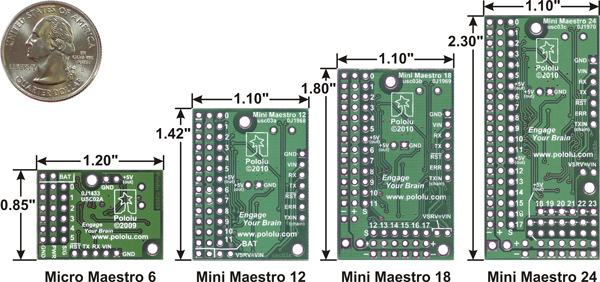 |
The fully assembled versions of the Mini Maestro ship with 0.1" male header pins installed as shown in the respective product pictures. The partial kit versions ship with these header pins included but unsoldered, which allows the use of different gender connectors or wires to be soldered directly to the pads for lighter, more compact installations. A USB A to mini-B cable (not included) is required to connect this device to a computer.
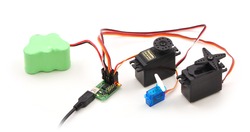 |
| Micro Maestro 6-channel USB servo controller (fully assembled) controlling three servos. |
|---|
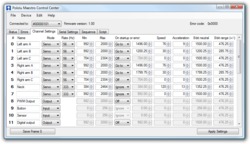 |
| The Channel Settings tab in the Maestro Control Center. |
|---|
 |
 |
 |
 | |
|---|---|---|---|---|
| Micro Maestro | Mini Maestro 12 | Mini Maestro 18 | Mini Maestro 24 | |
| Channels: | 6 | 12 | 18 | 24 |
| Analog input channels: | 6 | 12 | 12 | 12 |
| Digital input channels: | 0 | 0 | 6 | 12 |
| Width: | 0.85" (2.16 cm) | 1.10" (2.79 cm) | 1.10" (2.79 cm) | 1.10" (2.79 cm) |
| Length: | 1.20" (3.05 cm) | 1.42" (3.61 cm) | 1.80" (4.57 cm) | 2.30" (5.84 cm) |
| Weight(1): | 3.0 g | 4.2 g | 4.9 g | 6.0 g |
| Configurable pulse rate(2): | 33–100 Hz | 1–333 Hz | 1–333 Hz | 1–333 Hz |
| Pulse range(2): | 64–3280 ěs | 64–4080 ěs | 64–4080 ěs | 64–4080 ěs |
| Script size(3): | 1 KB | 8 KB | 8 KB | 8 KB |
1 This is the weight of the board without header pins or terminal blocks.
2 The available pulse rate and range depend on each other and factors such as baud rate and number of channels used. See the Maestro User’s Guide for details.
3 The user script system is more powerful on the Mini Maestro than on the Micro Maestro. See See the Maestro User’s Guide for details.
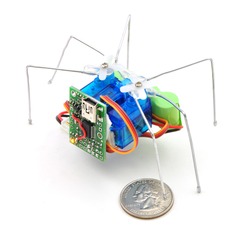 |
| Micro Maestro as the brains of a tiny hexapod robot. |
|---|
An example setup using a Micro Maestro to control a ShiftBar and Satellite LED Module is shown in the picture below and one of the videos above. Maestro source code to control a ShiftBar or ShiftBrite is available in the Example scripts section of the Maestro User’s guide.
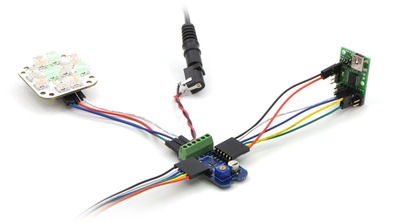 |
| Connecting the Micro Maestro to a chain of ShiftBars. A single 12V supply powers all of the devices. |
|---|
Responsible person BTC Korporacja sp. z o. o. Lwowska 5 05-120 Legionowo Poland sprzedaz@kamami.pl 22 767 36 20
Cable with USB plugs type A and mini-USB type B, cable with a length of 1.8 m
No product available!
The expansion module is designed to work with the micro:bit educational board. It can control 3 servos and 2 DC motors. Waveshare Motor Driver for micro:bit
Universal tester of servos and ESC regulators. It allows you to check the operation of the servo without the need for a transmitter and receiver
The expansion module is designed to work with micro:bit. It allows you to control 4 DC motors or two stepper motors and 8 servos. It communicates via the I2C interface. DFRobot DFR0548
Module with 16-channel PCA9685 servo driver designed for Raspberry Pi minicomputers. The board is equipped with a USB Type C power connector. SparkFun DEV-15316
No product available!
16-channel servo driver module with I2C interface based on the PCA9685 system. modPCA9685
No product available!
No product available!
This module enables the Feather series range to be expanded with 8 12-bit PWM outputs that can be used, for example, to control servos or LED diodes. Adafruit 2928
Universal tester of servos and ESC regulators. It allows you to check the operation of the servo without the need for a transmitter and receiver
Servo driver with UART serial interface. Equipped with an ESP32 module with WiFi and Bluetooth wireless communication. Waveshare Servo Driver with ESP32
Servo control module with 180 degree range of motion, No programming required and is ideal for operations such as opening and closing the mouth, hands or eyes. Control is performed using the built-in ATTiny13A, button and potentiometer, and each pressed button moves the servo to the other end of the range, with the possibility of adjusting the length of the movement. Kitronik 2177
The SparkFun Continuous Rotation (CR) Servo Trigger is a small robotics board that simplifies the control of hobby RC servo motors. You can use a hobby servo in your projects without having to do any programming! WIG-13872
No product available!
Module with a 16-channel PWM PCA9685 driver. The board is equipped with a Grove connector and communicates via the I2C interface. Seeed Studio 108020102
No product available!
Module with 8-channel servo driver. It allows you to control the speed of movement and the initial position of the servo. Cytron SC08A

